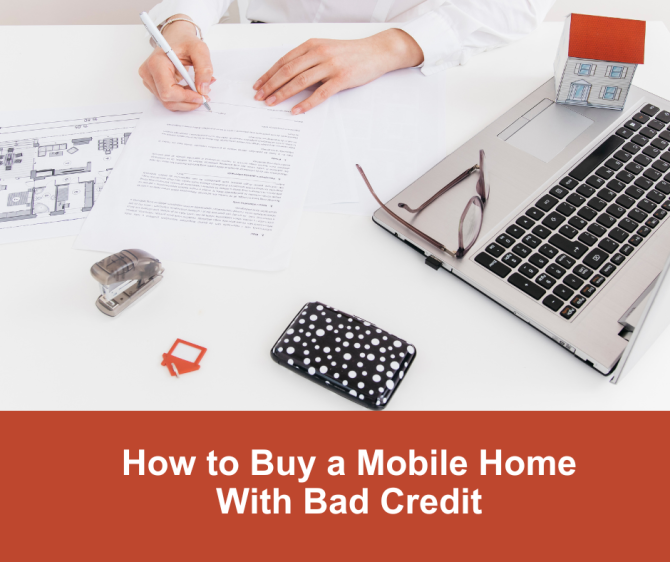Buying a home can feel impossible when your credit isn’t perfect. But here’s the truth: even with bad credit, you still have options. Mobile and manufactured homes make affordable housing achievable, and mobile home loans for bad credit are more accessible today than ever before. This guide breaks down everything you need to know, from what credit score you need to how to get approved, to the best loan options for buyers rebuilding their credit.

What Are Mobile Home Loans and Manufactured Home Loans for Bad Credit?
A mobile home loan works much like a mortgage, but it’s specifically designed for homes built in a factory rather than on-site. These homes are known as manufactured homes, and lenders treat them differently than traditional houses.
Manufactured home loans for bad credit are specialized financing programs aimed at buyers who have lower credit scores or limited credit history. These loans may have higher interest rates or stricter requirements, but they open the door to homeownership when banks might otherwise say no.
If you’ve had trouble with late payments, high debt, or other credit challenges, you can still buy a mobile home with bad credit through federal programs, portfolio lenders, or flexible financing arrangements. The key is knowing which options are right for your situation and how to strengthen your application.
What Credit Score Is Needed to Buy a Mobile Home With Bad Credit?
When it comes to what credit score is needed to buy a mobile home, the answer depends on the type of loan you apply for.
-
Conventional lenders (banks, credit unions) typically want a minimum score of around 620–640.
-
FHA Title II loans, which can finance the home and land together, often accept scores as low as 580.
-
FHA Title I loans, which are for the home only, can sometimes go even lower.
-
A few flexible lenders even offer mobile home loans with 575 credit score approval — though these usually come with higher rates or down payment requirements.
The lower your score, the more you’ll need to show stability elsewhere. That might mean a larger down payment, verifiable income, or a strong history of rental payments.
Ultimately, the goal isn’t just to get approved for mobile home loans for bad credit — it’s to secure terms that don’t cost you more than necessary in the long run.
Read also: How to Get an FHA Loan for a Mobile Home?
The lower your score, the more you’ll need to show stability elsewhere. That might mean a larger down payment, verifiable income, or a strong history of rental payments.
Ultimately, the goal isn’t just to get approved for mobile home loans for bad credit — it’s to secure terms that don’t cost you more than necessary in the long run.
Types of Mobile Home Loans Available Even With Bad Credit
Even if your credit history isn’t perfect, there’s a range of programs available. Let’s break them down.
1. FHA Title I / Title II Manufactured Home Loans
The Federal Housing Administration (FHA) insures two main programs for mobile and manufactured homes.
-
Title I loans cover just the home itself, whether or not you own the land it’s on.
-
Title II loans cover both the home and the land.
These loans are popular for mobile home financing with bad credit because the FHA’s backing allows lenders to approve lower credit scores.
2. USDA / Rural Housing Loans for Manufactured Homes
If you plan to live in a rural area, USDA loans are worth exploring. These government-backed programs can help you finance a manufactured home with little or no down payment. While you still need to meet income and property eligibility rules, USDA loans are known for flexibility when it comes to bad-credit mobile home loans.
3. State, Local, and Nonprofit Down Payment Assistance or Grant Programs
Many state and local housing authorities offer grants or low-interest loans to help with down payments or closing costs. These can make a huge difference if you’re buying a mobile home with bad credit and limited savings. Nonprofit organizations sometimes partner with lenders to support affordable housing for lower-income or credit-challenged buyers.
4. Portfolio Lenders, “Subprime,” or Bad Credit Mobile Home Loans Guaranteed Approval
Some private lenders specialize in bad-credit mobile home loans and guaranteed approval programs. These are not truly “guaranteed,” but they do have more lenient credit policies. Portfolio lenders keep loans in-house rather than selling them to investors, which means they can consider applicants with scores in the 500s.
Be cautious, though — these loans often come with higher interest rates. Compare multiple offers and calculate the total cost before committing.
5. Lease-to-Own, Rent-to-Own, or Owner Financing Options
If you can’t qualify for a traditional loan, consider alternatives like owner financing or rent-to-own arrangements. These options let you move into the home while you work on improving your credit and saving for a future down payment. It’s not instant ownership, but it’s a smart path for those struggling to find mobile home loans with bad credit.
Read also: Exploring Your Options: A Complete Guide to Mobile Home Loans
Step-by-Step: How to Buy a Mobile Home With Bad Credit
You don’t need a perfect score to own a home — but you do need a plan. Follow these steps to make it happen.
Step 1 – Check and Repair Your Credit (Pre-Application)
Start by reviewing your credit report for errors. Dispute any mistakes and pay off small debts where possible. Even raising your score by 20–30 points can help you qualify for better bad credit mobile home loan terms.
Step 2 – Save for Down Payment, Reserve Funds, and Closing Costs
Lenders love to see financial responsibility. Aim to save at least 10% for a down payment. Having extra funds for reserves shows you can handle emergencies, which strengthens your mobile home loans for bad credit applications.
Step 3 – Improve Your Debt-to-Income (DTI) Ratio & Show Stable Income
The lower your DTI ratio, the better your chances of approval. Try to reduce credit card balances and avoid taking on new loans. A steady job history of two years or more also helps lenders feel more confident.
Step 4 – Shop Lenders Who Accept Bad Credit Mobile Home Loans
Not all lenders treat mobile home financing bad-credit applicants equally. Search for those who specialize in manufactured housing or advertise flexibility for lower credit scores. Comparing quotes from at least three lenders can save you thousands.
Step 5 – Consider a Co-Signer or Co-Borrower
If you have a trusted family member with better credit, adding them to your loan can help. Lenders often approve mobile home loans with bad credit more easily when a co-signer strengthens the file.
Step 6 – Provide Strong Documentation & Write a Credit Explanation
Be ready to show proof of income, tax returns, and bank statements. If you’ve had credit challenges due to a life event (like medical bills or job loss), include a brief letter explaining what happened and how you’ve recovered. Lenders appreciate transparency — and it can make a difference with manufactured home loans for bad credit.
Step 7 – Negotiate Terms or Shop Alternatives If Denied
If your application is rejected, don’t stop there. Ask the lender why and what you can do to improve. Sometimes paying off a small balance or adding a co-signer can flip a “no” into a “yes.” You can also explore bad-credit mobile homes through lease-to-own or community financing programs while you keep building your credit.
Conclusion
Owning a home is possible — even with bad credit. You just need the right information, realistic expectations, and a bit of patience. Whether you apply for mobile home loans for bad credit, explore government programs, or look into rent-to-own options, the key is to start where you are and build from there.
If you follow the steps in this guide, you can buy a mobile home with bad credit and set yourself on the path to ownership — no perfect credit score required. With time, consistency, and smart financial moves, your mobile home can become the foundation for a stronger financial future.


